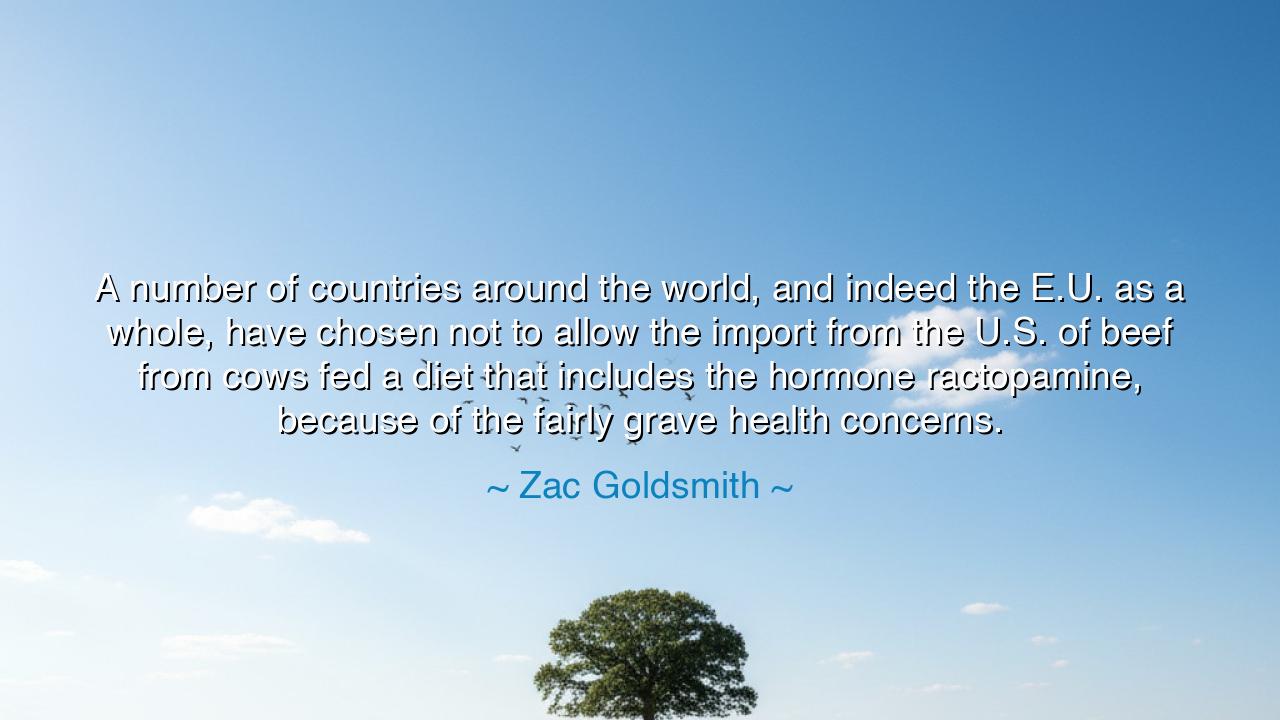
A number of countries around the world, and indeed the E.U. as a
A number of countries around the world, and indeed the E.U. as a whole, have chosen not to allow the import from the U.S. of beef from cows fed a diet that includes the hormone ractopamine, because of the fairly grave health concerns.






In the words of Zac Goldsmith, we hear not merely a statement of policy, but a call to wisdom: “A number of countries around the world, and indeed the E.U. as a whole, have chosen not to allow the import from the U.S. of beef from cows fed a diet that includes the hormone ractopamine, because of the fairly grave health concerns.” Beneath these measured words lies a truth as old as civilization itself—the struggle between profit and principle, between what can be done and what should be done. For this quote speaks not only of cattle and commerce, but of the eternal duty of mankind to guard the sanctity of life against the reckless hunger of gain.
The ancients taught that the Earth is not ours to plunder, but to steward. When the farmer feeds his beast, he does not merely nourish flesh; he feeds the hearts of those who will eat from its labor. Yet in the age of industry, we have turned nature into a mechanism, and food into a commodity. The hormone ractopamine, used to make cattle grow leaner and faster, stands as a symbol of this modern haste—a chemical emblem of mankind’s impatience. It whispers the same dangerous lie that has undone empires before: that speed is progress, and efficiency is virtue. But in truth, when we trade purity for profit, we are not feeding the world—we are poisoning its future.
There was once a time, in the empire of Rome, when greed found its way even into the bread of the people. To stretch the grain and fill the coffers, merchants adulterated flour with chalk and dust, ignoring the cries of those who fell ill. The Senate, slow to act, watched as sickness spread through the streets like a shadow over sunlight. It was only when the common people rose in outrage that reform was born. So too does Goldsmith’s warning echo through the ages: the health of the people must never be sacrificed upon the altar of trade. A nation that forgets this truth will one day find its tables full, but its people weak.
The E.U., in refusing the import of such meat, stands as a guardian against this forgetting. Its choice is more than political—it is ethical. It declares that the body of the Earth and the body of man are bound together, and what we feed one will nourish or corrupt the other. This act of restraint, though it may slow commerce, honors the ancient covenant between man and nature: take only what is wholesome, and return only what is clean. To heed health concerns is not weakness; it is wisdom clothed in caution.
Yet how easily men dismiss such caution. “Science will fix it,” they say. “The risks are small.” But wisdom knows that small risks, multiplied by generations, become great calamities. A single drop of corruption in the well can sicken the whole village. The wise ruler, therefore, looks beyond the profit of a season to the well-being of centuries. He knows that true abundance is not measured in quantity, but in the quality of life it sustains.
Let us, then, take Goldsmith’s words as more than commentary—they are counsel. Each of us, whether farmer, consumer, or citizen, holds power in our choices. To eat with awareness is to vote with one’s body for the kind of world we wish to inherit. Let us seek purity over convenience, integrity over indulgence. Buy food that comes from clean soil, not from laboratories of greed. Ask not only “Is it cheap?” but “Is it good?” For the health of the body mirrors the health of the Earth, and both cry out for our reverence.
And so, my friends, remember this truth: the measure of civilization is not its wealth, but its wisdom. The nations that pause before they poison, that listen before they consume, are those that will endure. In the end, Goldsmith’s warning is not about meat or markets—it is about the soul of humanity. To guard the purity of what we eat is to guard the purity of who we are. Therefore, let your daily bread be earned in honesty, your table set with care, and your choices made with the knowledge that the future itself dines at your side.






AAdministratorAdministrator
Welcome, honored guests. Please leave a comment, we will respond soon